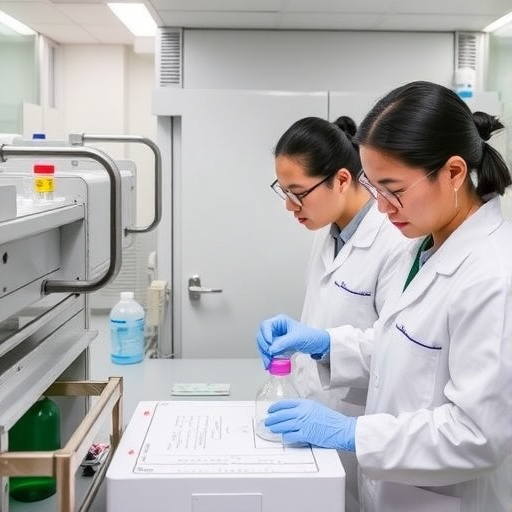Fluorinated covalent organic polymers (FCOPs) have emerged as highly effective materials for the remediation of persistent pharmaceuticals, particularly beta-blockers, from aquatic environments. These polymers are designed to harness the unique properties imparted by fluorine atoms, which enhance their adsorption capabilities. The primary focus of recent research led by Professor Yuhoon Hwang from the Seoul National University of Science and Technology highlights the ability of FCOPs to efficiently capture and remove beta-blockers, medications that remain a significant environmental concern due to their resistance to natural degradation processes.
Beta-blockers, including widely used drugs like atenolol and metoprolol, serve essential roles in managing various cardiovascular conditions. Their therapeutic efficacy, rooted in their chemical stability, poses a significant challenge when considering their environmental impact. Conventional wastewater treatment facilities often fail to adequately eliminate these compounds, leading to their accumulation in waterways. Even trace amounts can induce chronic toxicity, adversely affecting aquatic ecosystems and potentially compromising public water supplies.
The research team investigated FCOPs as a superior alternative to traditional adsorbents used for removing pharmaceuticals from contaminated water. The study, aiming to bridge the gap in current scientific understanding, reveals that these fluorinated polymers exhibit unprecedented adsorption performance for pharmaceuticals. By employing a straightforward, catalyst-free one-pot synthesis method, the team created FCOPs optimized for beta-blocker removal, achieving remarkable results.
In their experimental setup, the FCOPs demonstrated a striking ability to remove beta-blockers from water. The results showcased a removal efficiency of 67.3% for metoprolol and an impressive 70.4% for atenolol within the first minute of exposure. This rapid adsorption is attributed to the unique structural characteristics of the FCOPs, which allow for both monolayer and multilayer adsorption, a behavior not often observed with conventional adsorbents.
The researchers plotted the adsorption performance against beta-blocker concentration and found a sigmoidal curve, indicating that at lower concentrations, adsorption occurs gradually. This behavior aligns with monolayer adsorption, a phenomenon where individual molecules adhere to a surface. However, upon reaching a concentration threshold of 60 mg/L, a sharp increase in adsorption was observed, suggesting a transition to multilayer adsorption. Multilayer adsorption is critical because it signifies the stacking of molecules in multiple layers, thereby enhancing the overall adsorption capacity of the material.
Moreover, the FCOPs retained their effectiveness even in real water samples, which included various ions and organic compounds. This resilience is a significant advantage, as it demonstrates the potential for practical application in complex environmental matrices. The study further delves into the intricate mechanisms through which FCOPs exert their superior adsorption capabilities, with fluorine atoms playing a pivotal role in multiple synergistic interactions.
One key mechanism identified was the strong intermolecular interactions established between the FCOPs and beta-blockers, driven by the unique structural arrangements of the fluorinated materials. Furthermore, the study highlighted the role of electrostatic interactions, particularly the attraction between positively charged beta-blockers and negatively charged FCOP molecules, which aids in fostering effective adsorption. The hydrophobic nature of FCOPs also minimizes their interaction with water, promoting clustering of adsorbed molecules, supporting the multilayer adsorption process.
The implications of this research are profound. As Professor Hwang stated, “Our study presents FCOPs as a promising solution for addressing persistent beta-blockers in water. The insights into their adsorption mechanisms lay the groundwork for the development of next-generation adsorbents.” This innovative approach not only offers the potential for improved water treatment methods but also emphasizes the importance of environmental protection and public health safety.
In conclusion, the integration of FCOPs into advanced wastewater treatment systems could significantly enhance the ability of water utilities to tackle pharmaceutical pollution. Given the increasing prevalence of contaminants like beta-blockers in aquatic environments, finding sustainable solutions is imperative. This research not only highlights the unique properties of fluorinated covalent organic polymers but also sets the stage for future developments in environmental remediation technologies, paving the way for cleaner, safer water sources for generations to come.
The promising capabilities of FCOPs in removing harmful substances from water exemplify the progress being made in environmental science and engineering. As researchers continue to innovate and refine materials for water purification, it becomes increasingly essential to consider the ecological balance and the health of both ecosystems and human populations. The study led by Professor Hwang shines a spotlight on the critical intersection of advanced material science and environmental engineering, offering hope for more effective strategies in battling pharmaceutical contamination in our waters.
This research not only advances scientific understanding but also serves as a clarion call for urgent action in protecting our precious water resources. As we continue to grapple with the implications of persistent pharmaceuticals in the environment, the findings surrounding FCOPs could be instrumental in shaping future water treatment approaches, ensuring a healthier planet for all.
In summary, the study elucidates a groundbreaking approach to fabricating advanced adsorbents that show extraordinary promise for real-world applications. FCOPs exemplify the innovative strategies needed to address complex environmental challenges, pushing the boundaries of material science and paving the way toward sustainable solutions.
Subject of Research: Adsorption of beta-blockers using fluorinated covalent organic polymers (FCOPs)
Article Title: Efficient removal of beta-blockers from water using fluorinated covalent organic polymers: Insights into sigmoidal adsorption behaviour and environmental applications
News Publication Date: 28-Jul-2025
Web References: Environmental Research
References: DOI: 10.1016/j.envres.2025.122439
Image Credits: Professor Yuhoon Hwang from Seoul National University of Science and Technology
Keywords
Environmental engineering; Environmental management; Environmental remediation; Pollution control; Water management; Water treatment; Wastewater treatment; Pharmaceuticals; Water purification.
Tags: adsorption capabilities of materialsaquatic ecosystem toxicitybeta-blocker remediationchemical stability of beta-blockerseffective wastewater treatment technologiesenvironmental impact of pharmaceuticalsfluorinated covalent organic polymersinnovative materials for water purificationone-pot synthesis of polymerspharmaceutical removal from wastewaterSeoul National University researchsustainable water management solutions





